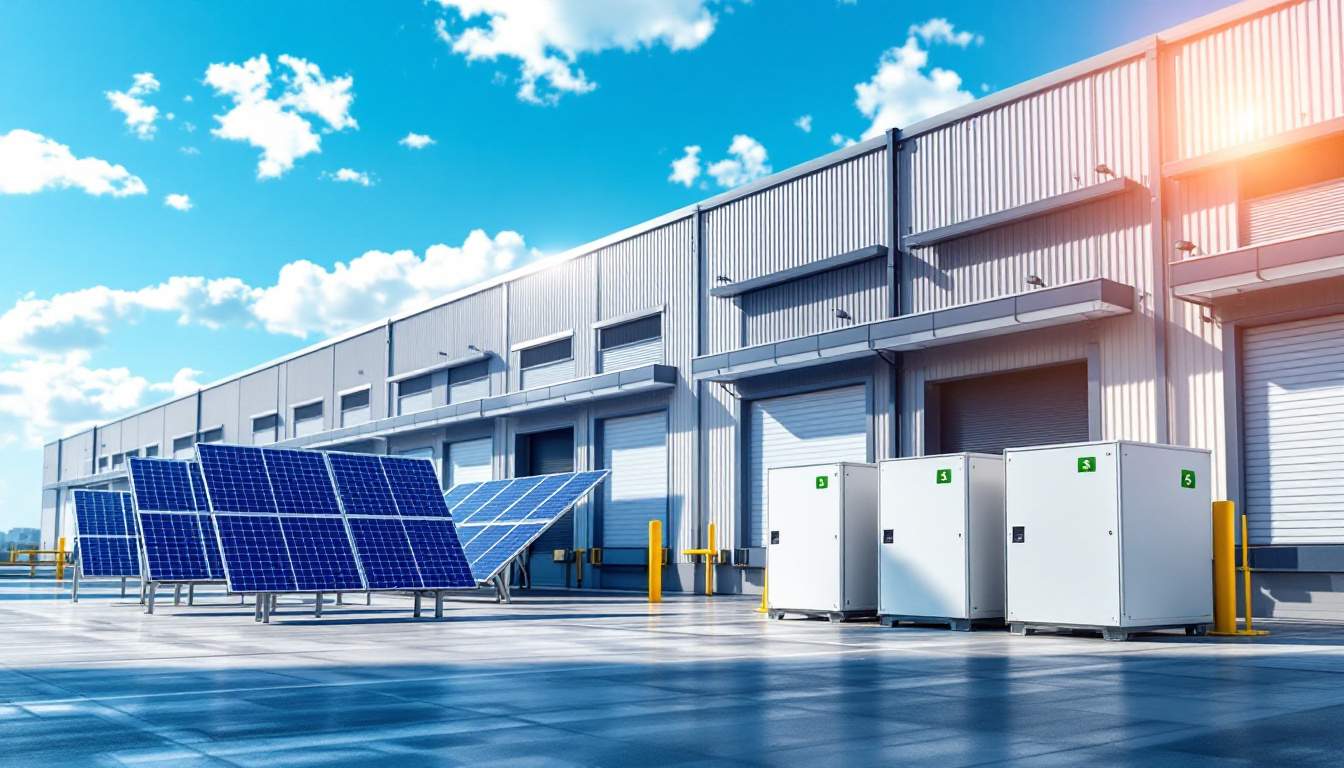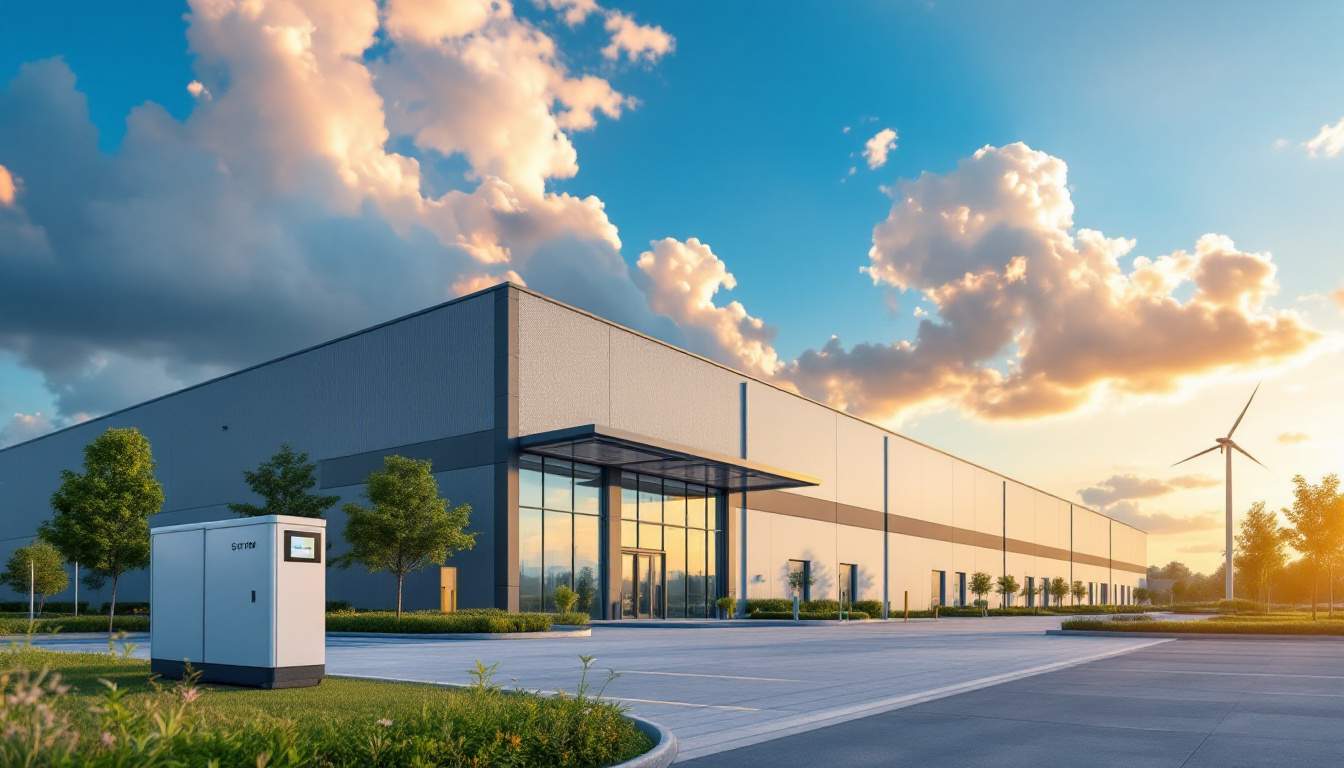In the modern era of energy efficiency and sustainability, warehouses stand at the forefront of adopting innovative solutions to reduce operational costs and environmental impact. Solar battery storage offers a compelling opportunity for warehouses to harness renewable energy, ensuring significant savings and energy independence. This article delves into the myriad benefits of solar battery storage for warehouses, providing insights into how this technology can transform energy management practices.
Understanding Solar Battery Storage
Solar battery storage systems are designed to store excess energy generated by solar panels, allowing warehouses to utilize this energy during peak demand times or when solar generation is low. This capability not only enhances energy efficiency but also provides a reliable backup during power outages. The integration of solar battery storage into warehouse operations can lead to a more resilient energy infrastructure, enabling businesses to navigate the complexities of energy management with greater ease and confidence.
The Basics of Solar Battery Storage
At its core, solar battery storage involves capturing and storing solar energy for later use. This technology is particularly beneficial for warehouses, which often experience fluctuating energy demands. By storing energy during periods of low demand, warehouses can draw on this reserve during peak times, reducing reliance on the grid and lowering energy costs. Furthermore, the ability to store energy can also help warehouses manage their energy consumption more effectively, allowing them to shift usage patterns and optimize their overall energy strategy.
Solar batteries come in various types, including lithium-ion and lead-acid, each offering distinct advantages. Lithium-ion batteries, for instance, are known for their high energy density and long lifespan, making them a popular choice for commercial applications. In contrast, lead-acid batteries, while generally less expensive, may require more frequent replacement and maintenance. Understanding the differences between these battery types is crucial for warehouses looking to make informed decisions about their energy storage solutions. Additionally, advancements in battery technology continue to emerge, with innovations such as flow batteries and solid-state batteries gaining traction, offering even more options for warehouses to consider.
How Solar Battery Storage Works
Solar panels convert sunlight into electricity, which is then used to power warehouse operations. Any excess energy not immediately used is stored in the solar battery system. When the sun isn’t shining, or during high-demand periods, the stored energy is released to meet the warehouse’s energy needs. This process not only ensures a steady energy supply but also maximizes the use of renewable energy, contributing to a more sustainable operation. By integrating solar battery storage, warehouses can effectively manage energy consumption and reduce dependency on traditional energy sources. This capability is particularly important in regions where energy prices are volatile or where grid reliability is a concern, as it allows warehouses to maintain operations without interruption.
Moreover, the implementation of solar battery storage can also facilitate participation in demand response programs, where warehouses can receive financial incentives for reducing energy consumption during peak periods. This not only provides an additional revenue stream but also contributes to grid stability, making warehouses valuable partners in the energy ecosystem.
Financial Benefits of Solar Battery Storage
Investing in solar battery storage can lead to substantial financial savings for warehouses. By optimizing energy usage and minimizing reliance on the grid, warehouses can significantly reduce their energy bills and improve their bottom line. The initial investment in solar battery storage may seem daunting, but the long-term savings and potential revenue generation can far outweigh the upfront costs, making it a financially sound decision for many businesses.

Reducing Energy Costs
One of the primary financial benefits of solar battery storage is the reduction in energy costs. By storing excess solar energy, warehouses can avoid purchasing expensive electricity during peak demand periods. This strategic energy management can lead to considerable savings over time. Additionally, many regions offer incentives and rebates for businesses that adopt renewable energy solutions, further enhancing the financial appeal of solar battery storage. These incentives can offset initial installation costs, making the transition to solar energy more accessible for warehouses. Furthermore, as energy prices continue to rise, the savings associated with solar battery storage will only become more pronounced, providing warehouses with a hedge against future energy cost increases.
In addition to direct energy cost savings, warehouses can also benefit from reduced demand charges, which are fees imposed by utility companies based on the highest level of energy consumption during peak periods. By utilizing stored energy during these times, warehouses can lower their peak demand and subsequently reduce their overall energy expenses. This multifaceted approach to energy management not only enhances financial performance but also contributes to a more sustainable operational model.
Enhancing Energy Independence
Solar battery storage empowers warehouses to achieve greater energy independence. By generating and storing their own energy, warehouses can reduce their reliance on external energy providers, insulating themselves from fluctuating energy prices and supply disruptions. This independence not only provides financial stability but also enhances operational resilience, ensuring that warehouses can continue to function smoothly even during grid outages or energy shortages. In an increasingly unpredictable energy landscape, the ability to rely on self-generated power can be a game-changer for warehouse operations.
Moreover, energy independence can also foster a sense of corporate responsibility and community engagement. By investing in renewable energy solutions, warehouses can position themselves as leaders in sustainability, attracting customers and partners who prioritize environmental stewardship. This alignment with broader societal values can enhance brand reputation and customer loyalty, further contributing to long-term success.
Environmental Impact and Sustainability
Beyond financial savings, solar battery storage offers significant environmental benefits. By leveraging renewable energy, warehouses can reduce their carbon footprint and contribute to a more sustainable future. The transition to solar energy not only helps mitigate the effects of climate change but also supports the global shift towards cleaner energy sources, aligning with international sustainability goals.

Reducing Carbon Emissions
Warehouses are often energy-intensive operations, contributing to significant carbon emissions. By adopting solar battery storage, warehouses can reduce their reliance on fossil fuels, leading to a substantial decrease in greenhouse gas emissions. This reduction in emissions not only benefits the environment but also aligns with corporate sustainability goals, enhancing the warehouse’s reputation as an environmentally responsible entity. Furthermore, as consumers become increasingly aware of the environmental impact of their purchasing decisions, warehouses that prioritize sustainability may find themselves at a competitive advantage in the marketplace.
Additionally, the implementation of solar battery storage can help warehouses meet regulatory requirements and avoid potential penalties associated with non-compliance, ensuring long-term operational viability. Many governments are implementing stricter regulations regarding emissions and energy consumption, and warehouses that proactively adopt renewable energy solutions will be better positioned to navigate these changes. This proactive approach not only mitigates risk but also demonstrates a commitment to sustainability that can resonate with stakeholders and customers alike.
Promoting Renewable Energy Adoption
By investing in solar battery storage, warehouses play a crucial role in promoting the adoption of renewable energy. This commitment to sustainability can inspire other businesses to follow suit, creating a ripple effect that accelerates the transition to a cleaner energy future. Furthermore, the use of solar energy can help warehouses meet regulatory requirements and avoid potential penalties associated with non-compliance, ensuring long-term operational viability. As more warehouses adopt solar battery storage, the cumulative impact on energy consumption and emissions reduction can be significant, contributing to broader environmental goals.
Moreover, warehouses can also engage in community outreach and education initiatives to raise awareness about the benefits of renewable energy. By sharing their experiences and successes, warehouses can encourage other businesses and individuals to consider solar energy solutions, fostering a culture of sustainability within their communities. This collaborative approach not only amplifies the impact of individual efforts but also strengthens the overall movement towards renewable energy adoption.
Implementing Solar Battery Storage in Warehouses
Successfully integrating solar battery storage into warehouse operations requires careful planning and execution. From selecting the right technology to optimizing system performance, several factors must be considered to maximize the benefits of this investment. The process of implementation can be complex, but with the right approach, warehouses can navigate these challenges effectively and reap the rewards of solar battery storage.
Choosing the Right Solar Battery System
The first step in implementing solar battery storage is selecting the appropriate system for the warehouse’s specific needs. Factors such as energy demand, available space, and budget constraints should be considered when choosing a solar battery solution. Working with experienced solar energy providers can help warehouses navigate these considerations, ensuring that the chosen system aligns with operational goals and delivers optimal performance. Additionally, warehouses should also consider the scalability of the system, as future growth may necessitate an expansion of energy storage capacity.
Furthermore, it is essential to evaluate the compatibility of the solar battery system with existing infrastructure. This includes assessing the current electrical systems, solar panel configurations, and any other energy management technologies in place. A comprehensive understanding of the warehouse’s energy landscape will enable decision-makers to make informed choices that enhance overall system efficiency and effectiveness.
Optimizing System Performance
Once the solar battery system is installed, ongoing maintenance and monitoring are essential to ensure optimal performance. Regular system checks and software updates can help identify potential issues early, minimizing downtime and maximizing energy savings. Additionally, warehouses should consider integrating energy management systems that provide real-time insights into energy usage and storage, enabling more informed decision-making and further enhancing energy efficiency. These systems can also facilitate predictive maintenance, allowing warehouses to address potential issues before they escalate into costly repairs or system failures.
Moreover, training warehouse staff on the operation and maintenance of solar battery systems is crucial for ensuring long-term success. By equipping employees with the knowledge and skills necessary to manage these systems effectively, warehouses can foster a culture of energy efficiency and sustainability within their operations. This commitment to education and training not only enhances system performance but also empowers employees to take an active role in the warehouse’s sustainability initiatives.
Future Trends in Solar Battery Storage for Warehouses
As technology continues to evolve, the future of solar battery storage for warehouses looks promising. Emerging trends such as advancements in battery technology, increased integration with smart grid systems, and the rise of energy-as-a-service models are set to reshape the landscape of energy management in the warehouse sector. These developments will not only enhance the efficiency and effectiveness of solar battery storage systems but also create new opportunities for warehouses to optimize their energy strategies.

Advancements in Battery Technology
Ongoing research and development in battery technology are leading to the creation of more efficient, longer-lasting, and cost-effective energy storage solutions. Innovations such as solid-state batteries and advanced lithium-ion technologies are expected to revolutionize the market, providing warehouses with even greater energy storage capabilities. These advancements will enable warehouses to store larger quantities of energy, reduce charging times, and extend the lifespan of battery systems, ultimately enhancing the overall return on investment.
Integration with Smart Grid Systems
The integration of solar battery storage with smart grid systems is another trend that holds significant promise for warehouses. Smart grids utilize advanced communication and automation technologies to optimize energy distribution and consumption, allowing warehouses to participate in demand response programs and other grid services. By leveraging real-time data and analytics, warehouses can make more informed decisions about energy usage, further enhancing their energy efficiency and sustainability efforts.
Conclusion: A Bright Future with Solar Battery Storage
Solar battery storage represents a transformative opportunity for warehouses to enhance energy efficiency, reduce costs, and contribute to a more sustainable future. By embracing this technology, warehouses can achieve greater energy independence, improve operational resilience, and align with environmental goals. As the demand for renewable energy solutions continues to grow, warehouses that invest in solar battery storage will be well-positioned to lead the charge toward a cleaner, more efficient energy landscape. With the right strategy and commitment, the potential savings and benefits of solar battery storage are immense, paving the way for a brighter, more sustainable future.
